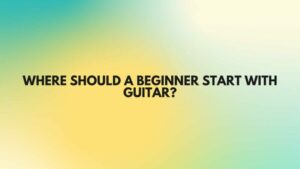Learning to play the guitar can be an incredibly rewarding journey, but it can also be overwhelming for beginners. With the right approach and guidance, anyone can become a proficient guitarist. In this comprehensive article, we will outline the essential steps and provide valuable tips to help beginners get started on their guitar-playing adventure.
1. Choose the Right Guitar
Before diving into lessons and practice, it’s essential to select the right guitar for your needs. Consider factors such as your preferred musical style, budget, and physical comfort. The main types of guitars for beginners include acoustic, classical, electric, and electric-acoustic. Each has its unique characteristics, so choose the one that aligns with your goals.
2. Learn Basic Guitar Anatomy
Familiarize yourself with the various parts of the guitar, including the body, neck, headstock, fretboard, strings, and tuning pegs. Understanding the instrument’s anatomy will make it easier to follow lessons and perform basic maintenance.
3. Start with Proper Posture and Hand Placement
Good posture and hand positioning are fundamental to playing the guitar comfortably and avoiding strain. Sit or stand up straight with your back against a chair or wall. Rest the guitar on your dominant leg (left leg for right-handed players, and vice versa) and keep your back straight. Place your fretting hand on the neck with your thumb behind the neck and fingers pressing the strings on the frets. Your picking hand should hover above the strings, ready to strum or pick.
4. Learn the Basics of Tuning
Tuning your guitar is essential for achieving the right pitch and sound. Beginners can use an electronic tuner, a smartphone app, or even reference pitches from other instruments to ensure their guitar is in tune. Standard tuning for a six-string guitar, from low to high, is E-A-D-G-B-E.
5. Start with Simple Chords and Strumming Patterns
Beginners often start with basic open chords such as C, G, D, E, and A. Practice transitioning between these chords smoothly and work on strumming patterns. Learning to change chords and maintain a steady rhythm is crucial for playing songs.
6. Invest in Quality Learning Materials
There are various resources available to help beginners learn the guitar. Consider enrolling in lessons with a qualified instructor, whether in person or online. Additionally, instructional books, online tutorials, and guitar apps can be valuable tools for learning.
7. Develop a Practice Routine
Consistent practice is the key to progress. Create a practice routine that includes exercises for finger strength, chord changes, scales, and songs you enjoy playing. Start with shorter sessions and gradually increase the duration as you become more comfortable.
8. Learn to Read Music and Tablature
While not mandatory, learning to read music notation and guitar tablature (tabs) can enhance your musical knowledge and repertoire. Tabs are especially helpful for beginners as they provide a visual representation of where to place your fingers on the fretboard.
9. Play Along with Backing Tracks and Metronomes
Playing along with backing tracks and metronomes can improve your sense of timing and rhythm. These tools help you stay on beat and develop a better understanding of musical phrasing.
10. Stay Patient and Persistent
Learning the guitar is a journey that requires patience and persistence. Don’t be discouraged by initial challenges, as progress may seem slow at times. Keep in mind that every guitarist, including the greatest virtuosos, started as beginners.
Conclusion
Starting with the guitar is an exciting endeavor that can lead to a lifetime of musical enjoyment. By choosing the right guitar, learning the basics of technique, and following a structured practice routine, beginners can lay a strong foundation for their musical growth. Remember to enjoy the process, stay patient, and celebrate your achievements along the way. With dedication and practice, you’ll soon be strumming your favorite songs and mastering the guitar.

